|
Artistic Director Trente Morant - 1997-1998 Hello all of my faithful readers, I know you are out there from the responses I have gotten from our wonderful Board president, Rachel Pokorny. I have also heard on Facebook from a former singer and tenor, Tim O'Bayley who now lives in Palm Springs, and from the young women from USF who have been at several rehearsals who told me that they enjoy reading about the history of our chorus and gay choruses that they have read about on their own. I would like to say a few more things about Pat Parr before moving on to the next Artistic Director. The Five Years of Madness concert that I wrote about last week was to have been on May 1 and 2, 1992. If you know your history from that time, that was when the Rodney King verdict was given to the police officers who beat him. April 30, our dress rehearsal at First Congregational Church, was the night of the Rodney King riots. We had to cancel our May 1 concert and we had to honor the people who had tickets for that show so our May 2 concert was a more than full house and due to the emotions of that time we gave a hell of a performance. This is one thing I will always remember about Pat and how he was able to get all of us through that time and that night. And one more thing - at the 19th Annual Pride Concert, which was Pat's last time with us at the podium, as I was reading through the program, the San Francisco Gay Men's Chorus sang their traditional Irish Blessing to him as a "Tribute to Pat Parr in Loving Appreciation for his Selfless Dedication and Uncompromising Artistry in the Choral Arts." This concert was also a tribute to Sky Evergreen, a jazz pianist and cabaret performer in the City in the 1980s. He wrote the arrangements for the songs we sang that night, "Lover Come Back To Me," "For All We Know," and "How Long Has This Been Going On." The chorus always appreciated his gift of music that he gave to us. Now onto my memories about our next Artistic Director, Trente Morant. He was the first African American AD for the chorus. I remember the first time I met him was when I was on the Artistic Advisory Committee and we had our first meeting with him. He has an impressive background in music. He toured the country for five years as Performer- Lecturer specializing in music from the Harlem Renaissance. He had also served as Musical Director for many theaters in the New York area for productions of "West Side Story," "Candide," "On the Town," "Pirates of Penzance," "Pippin," "Chicago" and others. He also served as Artistic Director of the Oakland Youth Chorus and had conducted in both the Monterey and San Francisco Jazz Festivals. He also performed in a concert version of "Porgy and Bess" with Michael Morgan and the East Bay Symphony.
Trente was with the chorus as AD for a year and led us in three concerts. The chorus was at about 45 strong at this time. The first was called "Love Is In The Air" and we sang music in a variety of styles that all had in some way to do with love. There were songs like "Unchained Melody," I Got Rhythm," "Don't Get Around Much Anymore," "Getting Married Today," "Let It Be Me," and "Ain't Misbehavin'." We also sang a song written by Sky Evergreen called "I Open My Heart" which had become a signature song for us. One of the fun highlights was a soprano and alto quintet singing "The Telephone Hour" from "Bye Bye Birdie" - "did you hear about Kim?, did she really get pinned?" Trente wrote some additional lyrics for "I Want to Be Happy" and made the song a lot gayer. As you can see Trente brought a lot of music to us from his background in theater. Trente was also a very flamboyant personality and when it came to concert nights we never knew what he would be wearing. Our second concert with him was called "Spice It Up" and we shared the stage at the Cowell Theater with Jill Togawa of Purple Moon Dance Project, Jackeline Rago of Crosspulse. Again Trente brought us a wide variety of music to perform by ourselves and with our special guests. There was a lot of rhythm and movement woven through the songs. We sang "I've Got Plenty of Nothing" from "Porgy and Bess", two songs by Sweet Honey in the Rock, "Oughta Be a Woman" and "Breaths", a couple of spirituals, "I've Been 'Buked" and "Hold On" which we also have sung recently. We sang a "Gloria" in the traditional manner which was written and arranged by Trente. We also performed two excerpts from "Spiritual Procession" by Jackeline Rago, "Sangueos," and "Calypso" and ended the show with "Under the Full Moonlight" and "Afro Blue" which was written by Oscar Peterson and arranged by Trente. The third concert with Trente was the 20th Annual Pride Concert - High on Pride - 20 Years Singing Proud. Our special guests were Qwire - Canberra, Australia's Gay and Lesbian Chorus, SFGMC and San Francisco Lesbian/Gay Freedom Band. We were hosts to the chorus from Canberra and we had a rehearsal together and social time with them in the days before the concert. It was fun and inspiring to meet these singers from down under. They had also been to Portland to sing with the Portland Lesbian and Gay Chorus. Some of the music we sang was "Tuxedo Junction" arranged by Trente, "Sentimental Journey," "I Open My Heart" and we ended with a piece by Trente called "Take Off," which we did that night. Trente really showed and helped us how to be able to move and sing at the same time and to trust and believe in ourselves that we could do and sing anything and above all to have fun. If you would like to see Trente perform, he will be doing a show at the Society Cabaret located in the Harvey Milk Center, 50 Scott Street, on May 17 at 8:00 pm. The show is called "Get on Your Mark, Get Set, Sing." I am sure this will be a wonderful evening of his music. Next week I will be writing about our interim director, Bill Ganz. Cheers, love, song, Michael Lucero
0 Comments
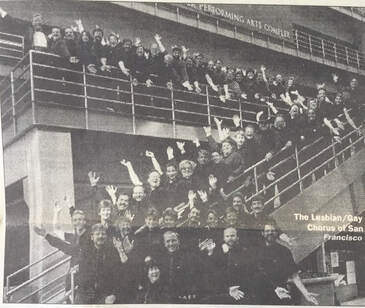 Part II of the Pat Parr Years - 1992-1997 Hello to all my faithful readers. This week I will be writing about my memories of our Artistic Director, Pat Parr, from 1992 through 1997. But first I would like to go back to 1988 and our spring concert "A Touch of Classics." In the program notes, Pat tells of what he would like to have the chorus perform and his answer was "Gabriel Faure's Requiem" which we sang in this concert. We also performed outside of San Francisco for the first time in Berkeley. This was an example of what we would learn was how Pat thought outside of the box. By 1992, Pat had over the past couple of years had established that we would do a big production show in spring, the Pride concert in June and a more typical classical style concert in the fall. Our big spring concert in 1992 was called "Five Years of Madness." In the program notes, Pat wrote "Tonight's concert is a compilation of some of my favorites from our past 'production' concerts. While it is great to do Brahms and Bernstein, it is equally exciting to get on stage and put on a 'show.' Many Lesbians and Gay Men in the legitimate theatre (and on screen) never have a chance to sing a love song to or about the person of their dreams. The five productions represented tonight have allowed us not only to camp it up and laugh, but also to share some of our deeper emotions." The picture of the chorus on stairs was taken at the 1992 GALA Choruses Festival in Denver. Don't we look fabulous. Some of the madness that we presented onstage was to bring what we did backstage onto the stage. There were panels located on the stage behind which we did quick costume changes in preparation for the next songs. The shows we sang music from were "The Lesbian/Gay Chorus Rides Again," "The LGCSF Goes to the Movies," The LGCSF Goes to Broadway," "Radio Daze," and "Bobby Sox to Beatles." As you can imagine, each of these shows required different sets and costumes and of course all of the music for these shows was memorized. There was lots of hard work but it all paid off for us and for our audiences. For this concert, we had 76 members and Pat worked with Gregg Tallman as stage director and Gene Russo as choreographer. Pat's dedication to the chorus and his vision for it is what motivated us as singers to give our all to be the best we could be. In 1994 and 1995 we had season brochures and the fact that we were able to do this was in large part due to the vision of Pat and our Board of Directors. In 1994, the chorus received the San Francisco Chamber of Commerce Arts Excellence Award. 1995 was our Crystal Anniversary year and it was called "A Season of Stars." We also had a Community Advisory Board up until 1996 and among the people on this board were a number of financial angels that helped the chorus behind the scenes. In April of 1994, we travelled to Seattle as guests of the Seattle Lesbian and Gay Chorus to sing in their concert called "Boys and Girls Together." The Vancouver Lesbian and Gay Chorus were also on the concert. This was a great time for us to be able to meet and perform with these other wonderful singers. Also in March 1994 we recorded and released our first CD "Together in Harmony" featuring music that we had performed with Pat up to that point. One of the attachments is a copy of the order form for the CD we used. As you can see, 1994 was a busy year for us. Also during these years, we were the producer of the Pride Concert so this meant arranging to have guest performers like the SFGMC and the Freedom Band, the Golden Gate Men's Chorus, Voices Lesbian Ensemble and other groups to share the stage. This also meant many meetings with representatives from all of these groups to have all of their program information and whatever staging needs might be needed. During this time, I was a member of the Production Committee. Pat always had big ideas especially for the production shows and we had to somehow rein him in and say this is our budget and we have to stick to it. I remember at that time all of the chorus committees worked closely together and there were monthly committee chair meetings to keep abreast of what we were all doing. Pat insisted that all of this coordination was happening to make things go as smoothly as possible as concert dates approached. The big production concert of 1996 was a "Tribute to the Music of Elton John." Our accompanist, Dwight Okamura, was a big Elton fan and he really showed his piano chops during the concert, especially on "Funeral for a Friend/Love Lies Bleeding" from "Goodbye Yellow Brick Road," which opened the second half of the show. We had lots of fun at our weekend retreat decorating our big Elton glasses, and working on our costumes as well as the choreography and music for the show. In 1997, we did a switch in our former concert order. Pat had always wanted to conduct "Carmina Burana" and the opportunity came up in conjunction with the Peninsula Ballet. We did two shows, one at the Palace of Fine Arts Theatre and at a theatre in Los Altos. The 1997 Pride Concert was Pat's last time conducting us and we gave the songs we sang and gave our all for him. It was a great sendoff for him but also a sad time for us. But we moved on and I will be writing about our next Artistic Director, Trente Morant, next week. See you then. In harmony and love, Michael Lucero 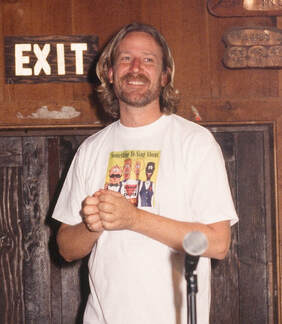 Pat Parr, AD, Part 1 - 1987-1991 As I continue the History Corner and writing about the Artistic Directors that I have sung with, I share my memories of the first five years with Pat Parr. After an artistic director search through early 1987, Pat was chosen by vote to be our new AD. As stated in his biography in the 9th Annual Pride Concert program, which was his first conducting the chorus, he came to LGCSF with a wide variety of musical experience. He was a Summa Cum Laude graduate of Oklahoma City University. Pat moved to San Francisco in 1976 and had been musical director of shows in SF, Berkeley, Santa Clara and Yosemite National Park. In 1980 he was accompanist for the San Francisco Girls Chorus and in 1982 became accompanist for the Contra Costa Chorale. He also sang with the Dick Kramer Gay Men's Chorale prior to becoming our AD. I received a response from a former tenor in the chorus, Tim O'Bayley, saying that he had read my recent blog about Matt O'Grady and how much he enjoyed it as it brought back memories. Tim also said he was wondering what I would be writing about Pat since Tim joined the chorus in 190. As the chorus got to know him and Pat began to know the chorus through our first rehearsals, it was obvious that he was a good fit for us. With his blonde good looks and outgoing and welcoming personality, soon half of the men of the chorus had fallen in love with him. As Pat met with the Board of Directors and the various committees of the chorus, he began to lay out what he wanted from the chorus regarding the types of concerts he envisioned us performing. He wanted to do a "stand and sing" style concert, which were mostly in the classical tradition but also to perform music by gay and lesbian composers. He also wanted us to do big shows with us in costumes and performing some sort of "choralography." And he wanted us to produce the Pride Concerts and also to sing in holiday concerts. One thing that I remember about the first Pride Concert that Pat conducted was that was the first time we sang "Hand in Hand" by a member of the chorus, Jesse Kane. We sang this as the finale to the concert. In August, there was a review of this concert in The Advocate, and it said in part that "the surprises of the show were the Lesbian/Gay Chorus of San Francisco and its pops offshoot Menage, both under Pat's direction. Under the leadership of Parr, the Lesbian/Gay Chorus has discovered a new fullness and balance that previous concerts had not revealed. The group's singing of Jesse Kane's "Hand in Hand" provided one of the most moving moments in choral singing I've seen. On the last line, "We're hand in hand reaching out for one another, hand in hand," ASL interpreter Stefan Lazar stood still and sang while the chorus sang and signed the words." To me that was the signal that Pat would be taking us on a great and wonderful journey of really finding out who we were as singers and interpreters of the music we sang. Our first big show was LGCSF Rides Again, a country western music themed show. We featured four country music dance groups from around the Bay Area and they were all big hits. Next for us in 1987, we were honored, along with the SFGMC, to be invited by Joan Baez to sing in her Christmas concert held at the Warfield Theatre. This was also broadcast live on KQED on that night. In 1988, we followed the pattern of concerts that Pat had designed. Our spring concert was a classical one, in June was the Pride Concert, our fall concert was our big production show. By the time of the fall show, we were at 50 strong and growing. Also that year we were invited to participate in a fundraising show for the AIDS Emergency Fund at the Palace of Fine Arts Theatre called "In Memory of Friends and in Support of Those Living with AIDS." In 1989, again we followed the above pattern of concerts. This year we also went to Seattle to perform over the course of a week in July at the GALA Choruses Festival along with 47 other choruses from the U.S. and Canada. This was an eye opening experience for us to know that there are all these other talented lesbian and gay choruses out there to learn from and share our love of music and to perform in front of our peers. This was held at the University of Washington and all choruses stayed in the dorms for the week. That of course led to lots of fun as we got to know the singers from other choruses who were staying just down the hall or a floor above or below us. So next week I will be writing Part 2 of the Pat Parr years 1992-1997. Love, in harmony, Michael Lucero 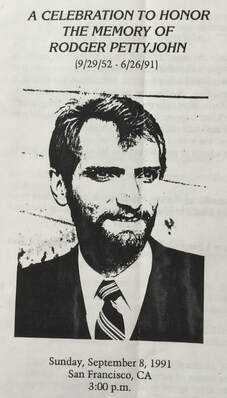 Rodger Pettyjohn, 9/29/52 - 6/26/91 Hello faithful readers. First I want to make a correction - the person who was our interim director in 1985 after Matt O'Grady left us was Bill Ganz, a member of the chorus and director of a chorus subgroup, Vocal Minority. Those early months in 1985 we were down to a core group of 12 singers. With Bill we continued to rehearse and sing at hospitals and hospices. We were fortunate to have Russell Kassman donate rehearsal space in his piano store for us at that time. Some of what follows is from an article written by chorus member Karen McMickle and my memories of Rodger Pettyjohn. After an artistic director search, Rodger came to us in September 1985. He had already had a history in San Francisco of making music. In 1980, his first venture into community organizing came as the creator of the men's chamber chorus Die Mannerstimmen and co-founder of the Society of Gay and Lesbian Composers in 1981. Based on the ideal of inclusion rather than exclusion, the successful Composers' Society was a daring move at a time when gender separatism ran high within the gay community. Rodger left the Composers' Society in 1983 to spend a year in Germany studying composition with Karlheinz Stockhausen. This mentor impressed upon him the importance of the computer in contemporary classical music. When he returned to San Francisco, he began experimenting with all electronic compositions such as his Electronic Etudes. As you will see, 1986 was a busy year for Rodger and the chorus. When he came to the chorus, Rodger's firm insistence on bonding the members of LGCSF together into a family succeeded in bringing the group from near extinction. He saw great potential in LGCSF being a highly visible statement of of the positive achievement made possible by men and women working together. After "making LGCSF known to the community" by having them sing on Castro street corners, in April 1986 Rodger led the chorus in a concert whose theme was his most ardent political cause - individual rights and freedom. Proceeds from this successful performance earned commemoration on the Statue of Liberty's plaque for the first openly gay group to donate to the restoration fund. At the Pride Concert in June, "A Little Guts & Lots of Glitter", LGCSF received the first standing ovation in their history. Caught up in the enthusiasm generated by the audience, Rodger launched into an unplanned, unrehearsed rendition of "I Sing the Body Electric" without music. Halfway through the piece, the entire group forgot the song. Our accompanist, the brilliant Dwight Okamura, vigorously vamped and Rodger conducted with committed determination until the collective memory of the performers returned and, as if on cue, they finished with a resounding "We are the emperors now and we are the czars, and in time we will all be stars." The crowd went wild with another ovation, more for our chutzpah and Rodger than for the technical performance of the song. But that was what he brought to us, that feeling we could do anything. In August 1986, a landmark performance by LGCSF showcasing works by lesbian and gay composers inaugurated the San Francisco Arts and Athletics Gay Games II Procession of the Arts. The concert featured the premiere of "For Those We Love" by Rodger. It integrated soloists, chorus, instruments and electronic musical and visual media. We also performed "Passengers of Infinity" by Kristin Norderval, which was commissioned by Rodger for LGCSF. This concert won LGCSF their first Cable Car Award for Outstanding Concert and Rodger was featured in the cover article in "The Advocate" magazine. For the Gay Games proper, Rodger had put the finishing touches on "The Best of Games are Gay," with words by James Broughton. This was the Gay Games II anthem and was performed at the closing ceremonies by a chorus comprised of men and women from all of the Bay Area gay choruses. This was a precedent setting event which impressed Gay Games delegates from around the world with Rodger's idea that unity within the community could become a reality. That fall, Rodger was busy creating and directing Menage, an octet of professional singers culled from the ranks of LGCSF. The small size of this group allowed him to get his message of gay men and women together out to non-concert goers at bars, cabarets, and private parties. He also had Menage singing outside the gay ghetto by having them perform for more mainstream events. His last time directing LGCSF was in the SFGMC's show "Now Sing with Hearts Aglow." He had been diagnosed with "severe ARC" and he resigned from his nursing job and LGCSF. He moved back to New York and began the next part of his life showing the world that his new audio-visual works were anything but MTV. He was also one of the original members of the New York organizing committee of the National Leather Conference. He also began giving free AIDS education lectures at the Community Health Project in NYC. He returned to San Francisco for the 1990 AIDS Conference and was an active member of Act Up New York. On June 26, 1991, Rodger died peacefully in NYC at the age of 38. He was an amazingly creative man. In that short time he lived a full life doing what he wanted to do and his many gifts will live on in the hearts of us who knew him and sang with him. Next week I will be writing about Pat Parr. Cheers and love, Michael Lucero |
Archives
May 2023
Categories
All
Bloggers |
© Queer Chorus of San Francisco. All rights reserved.

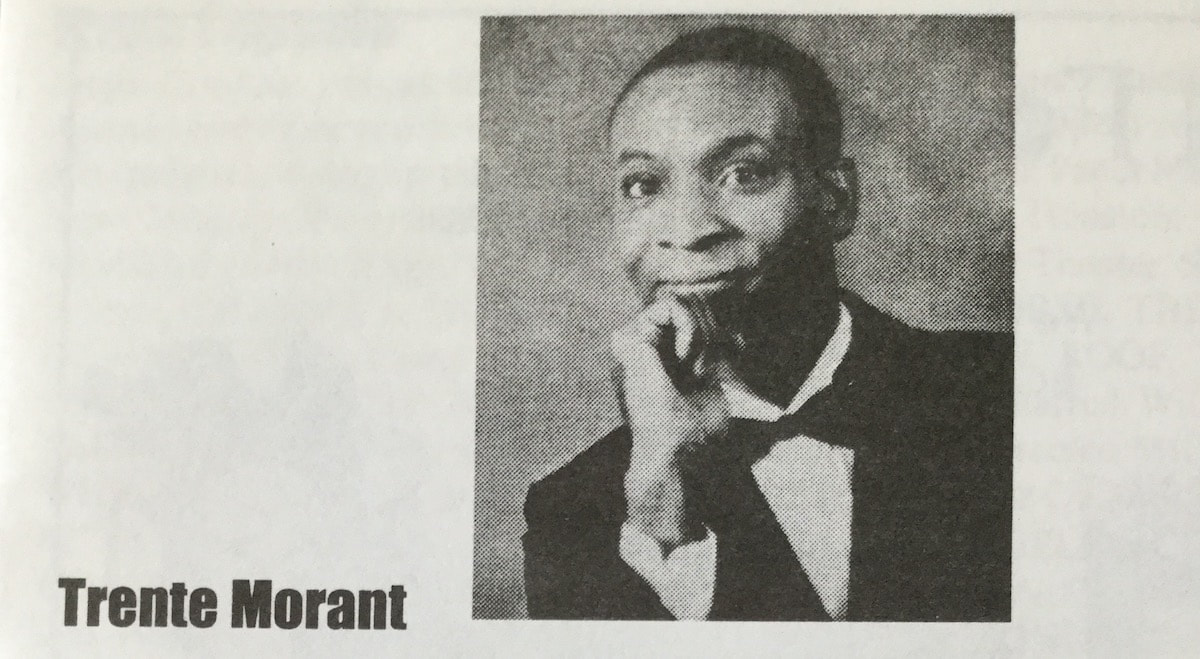
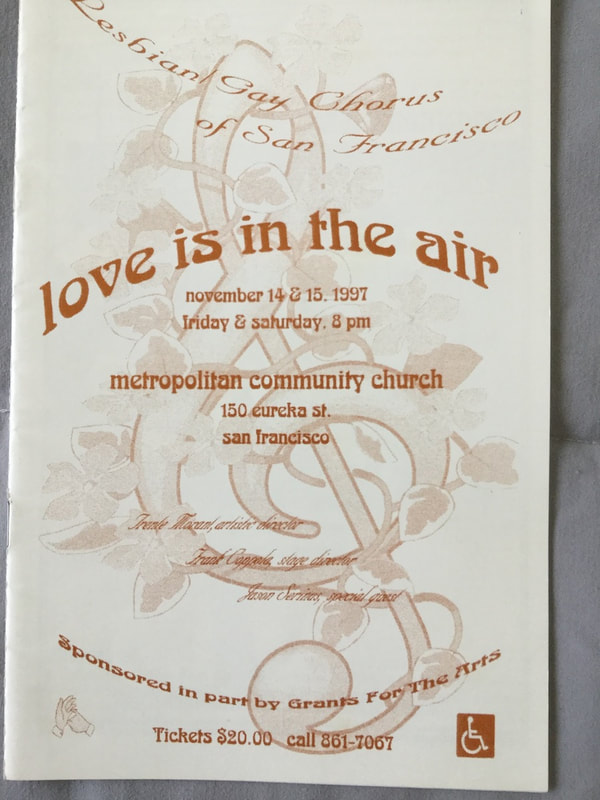
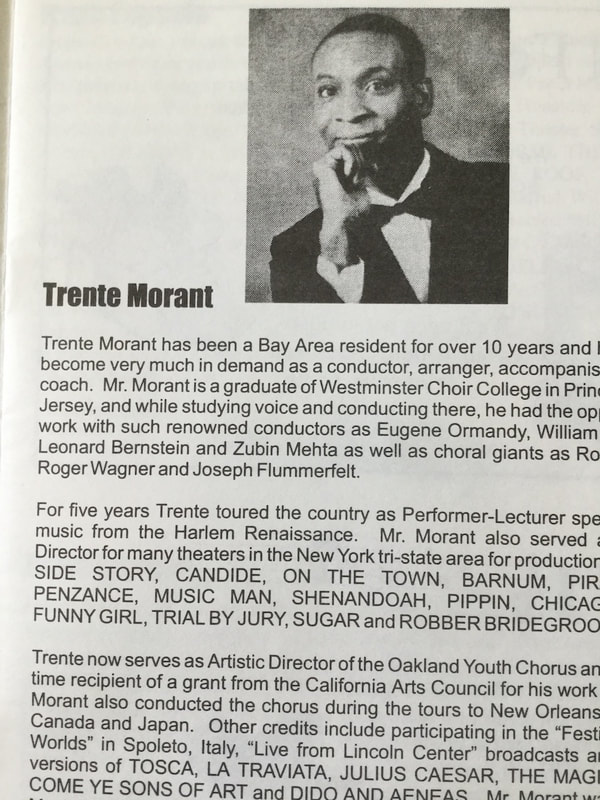
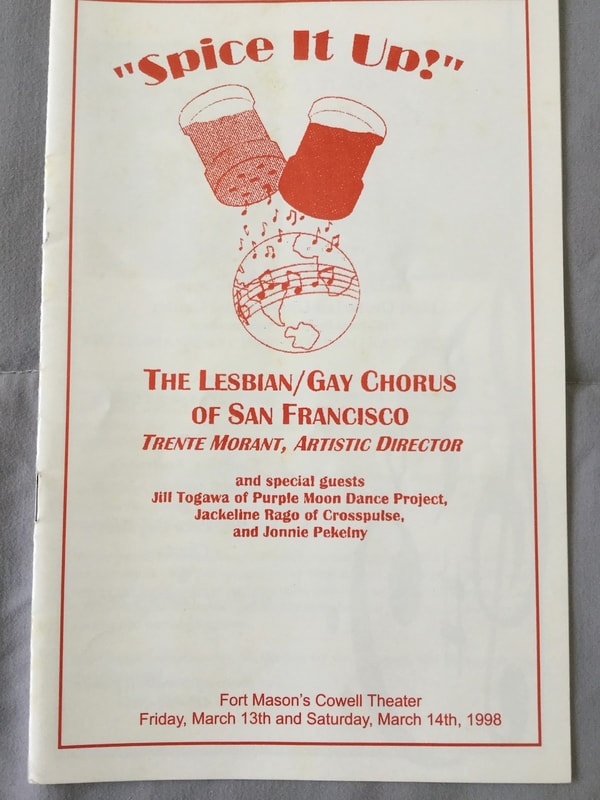
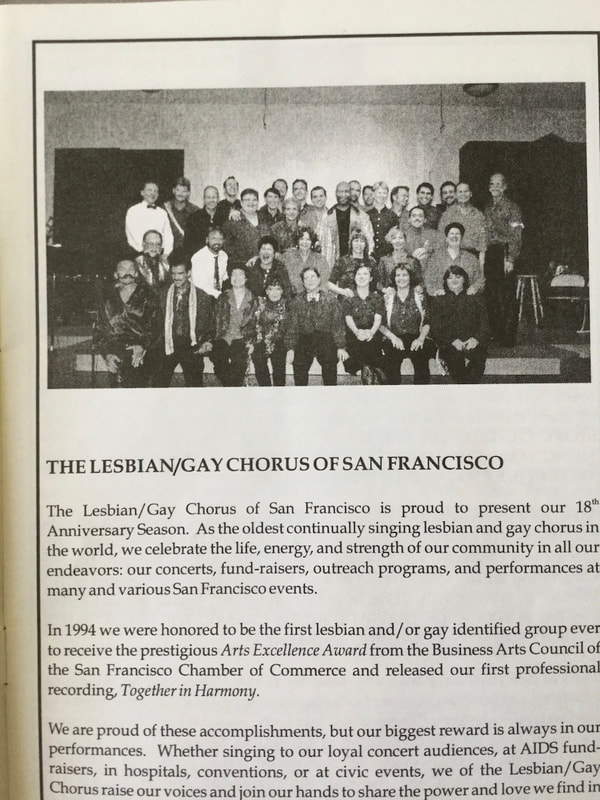
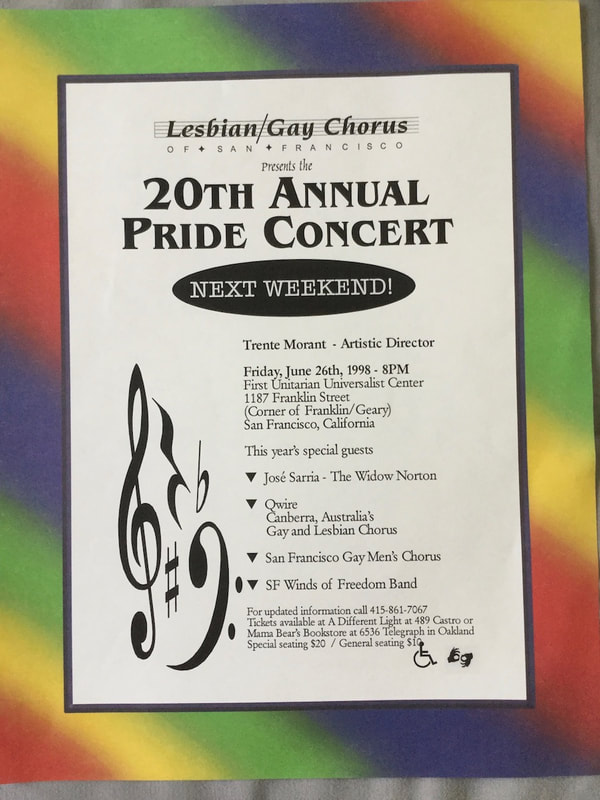
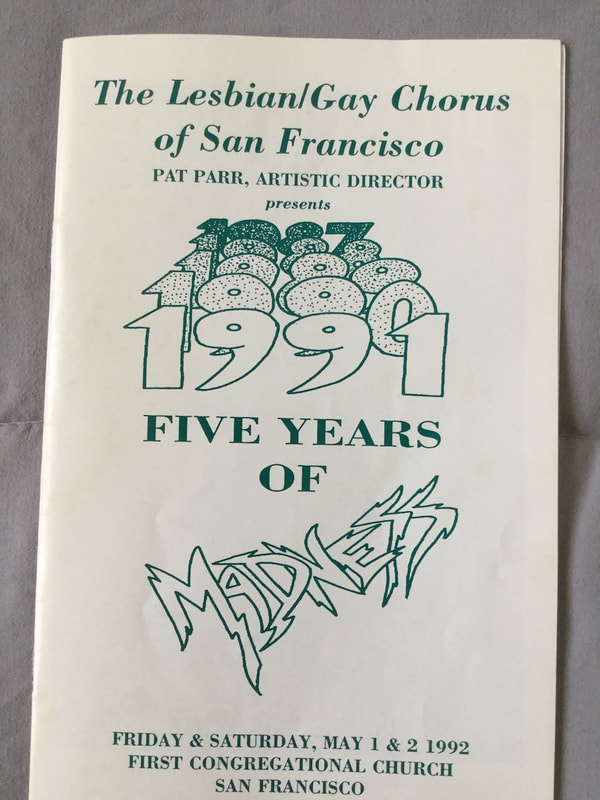
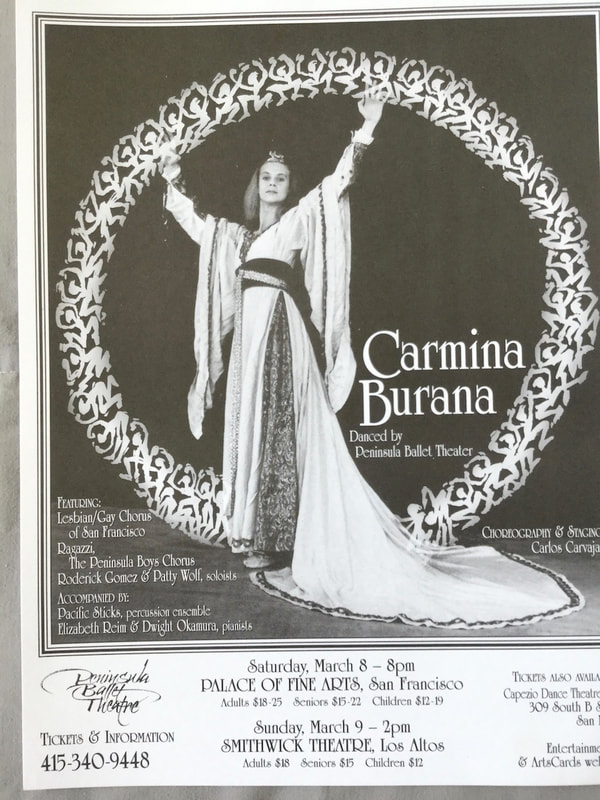
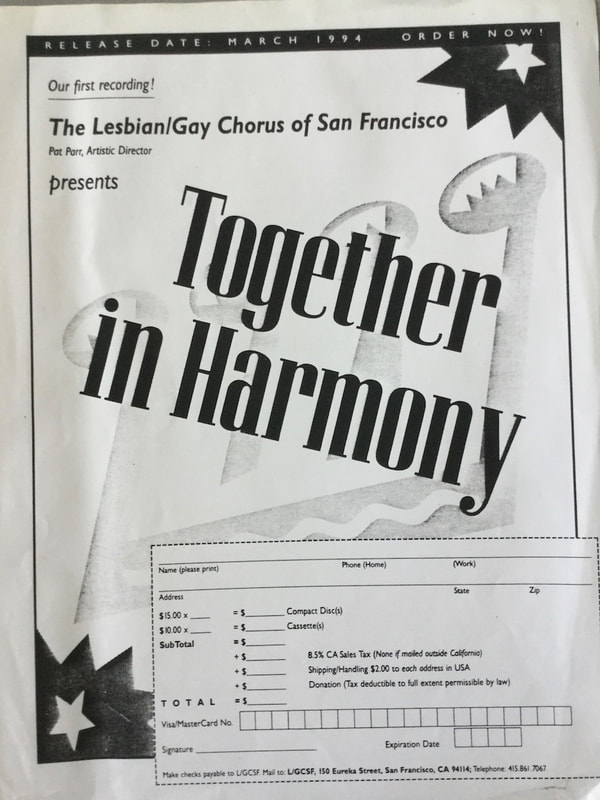
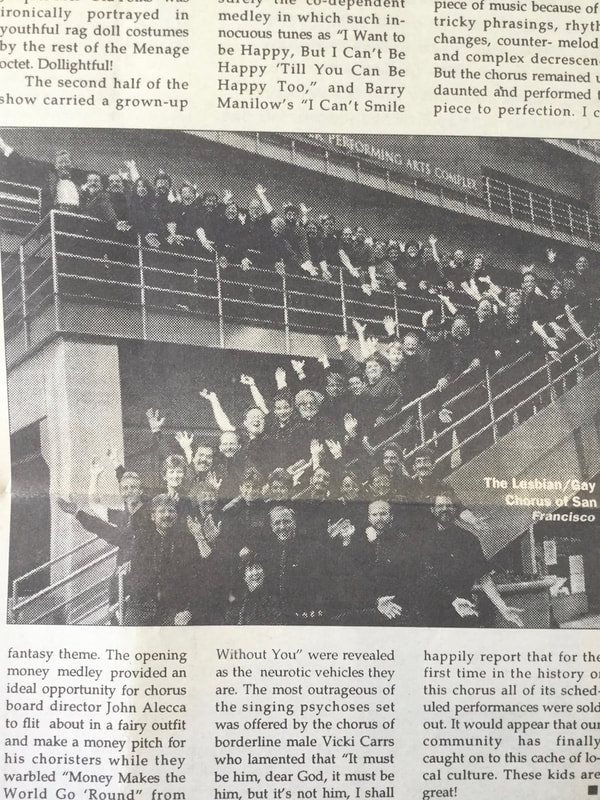
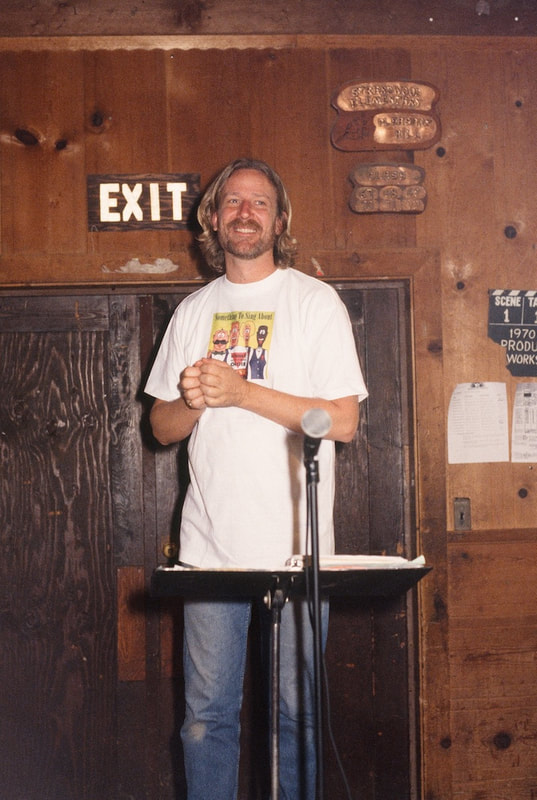
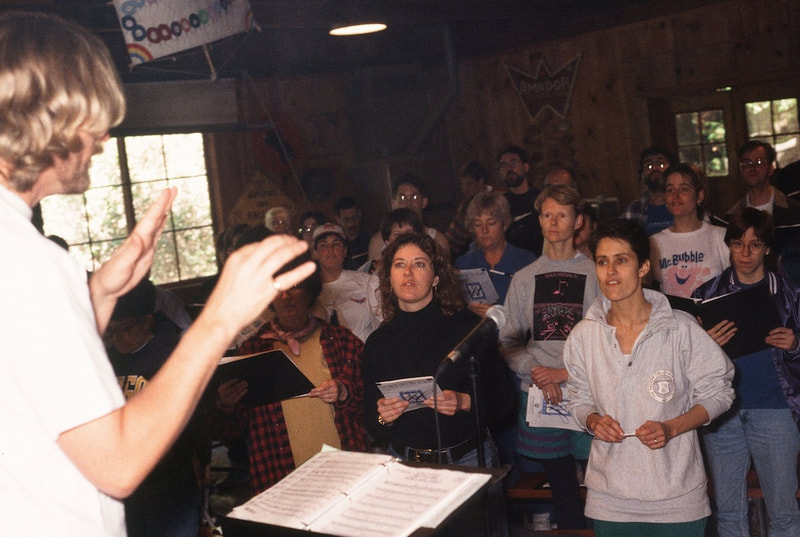
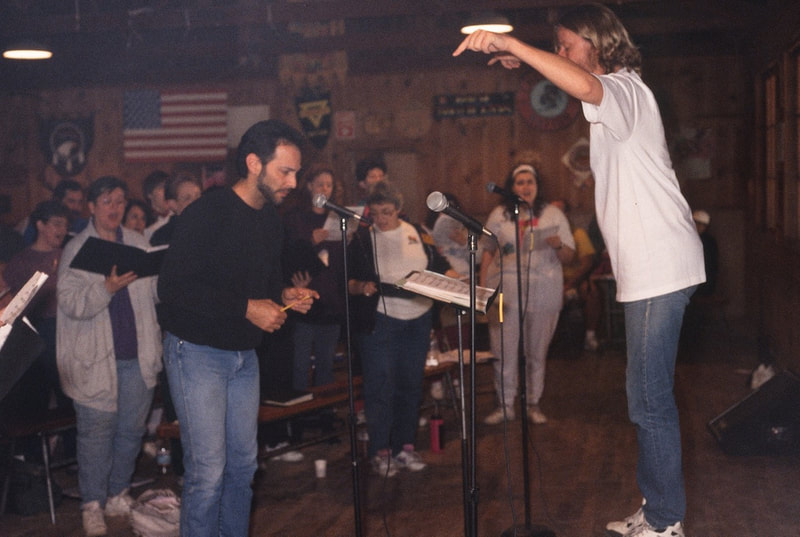
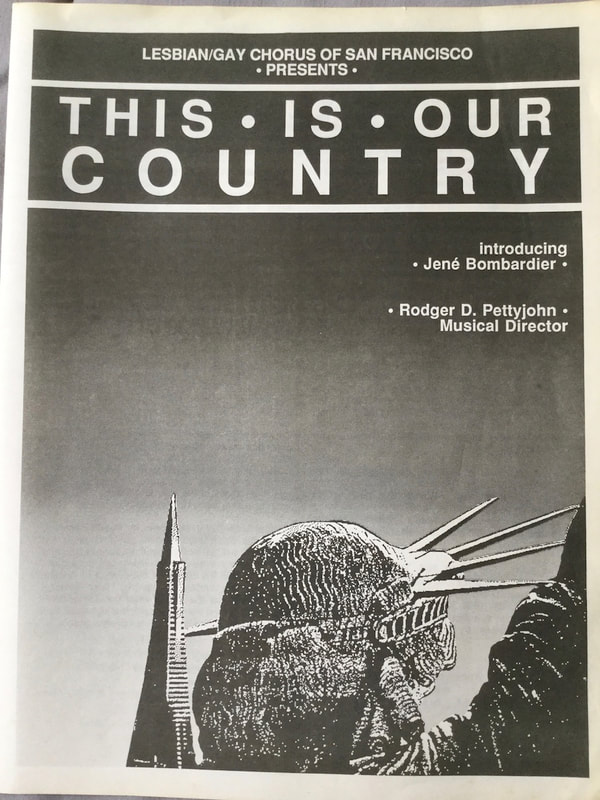
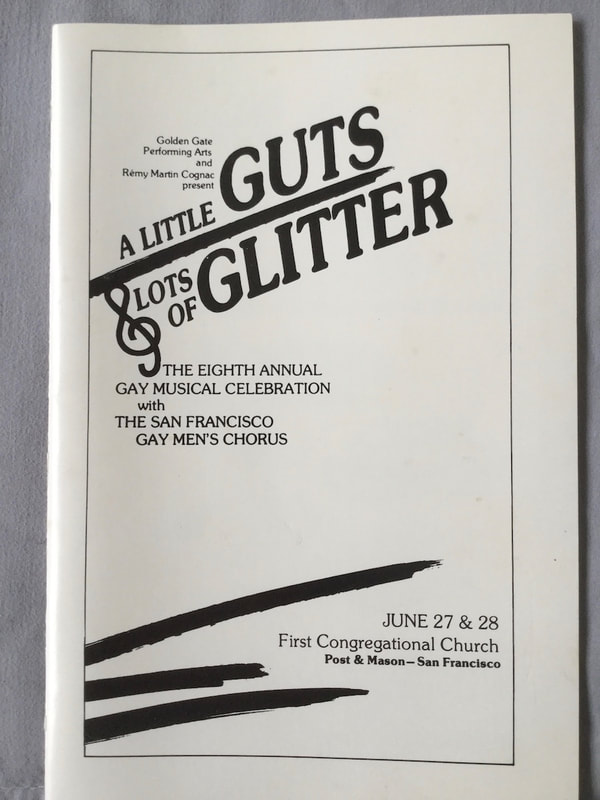
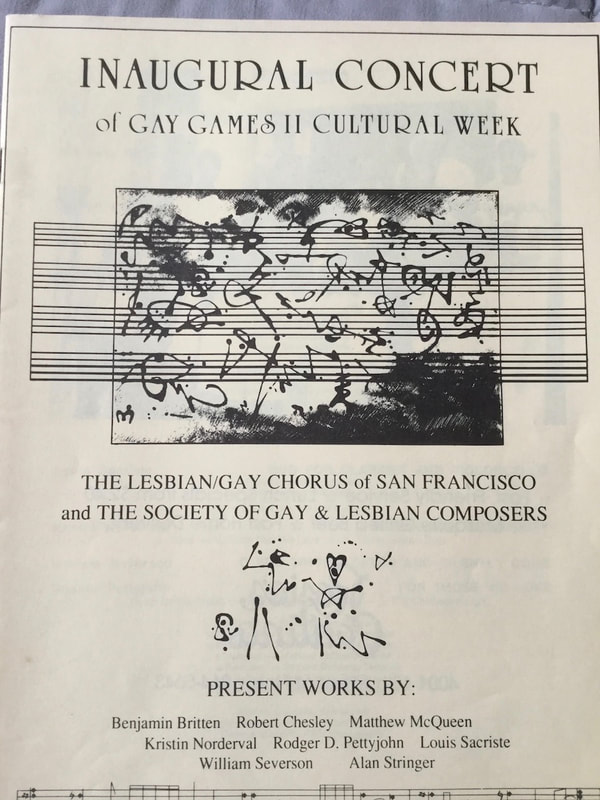
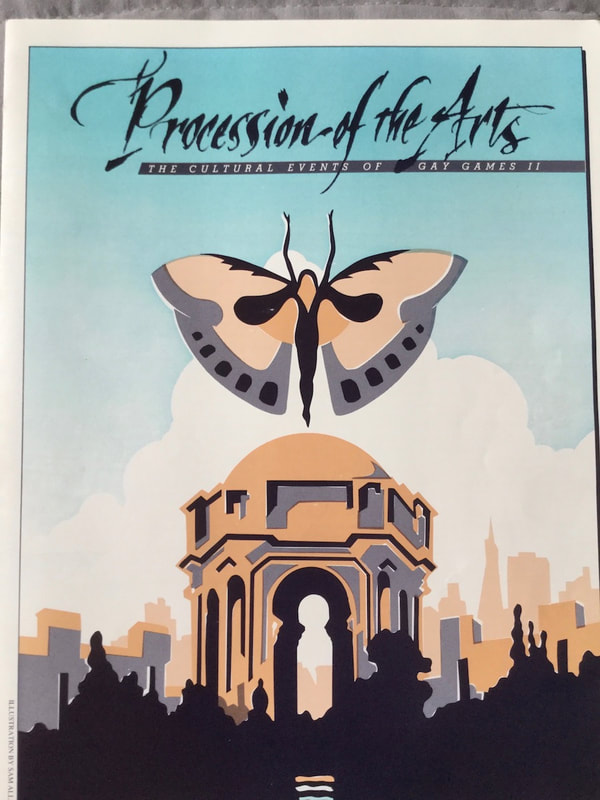
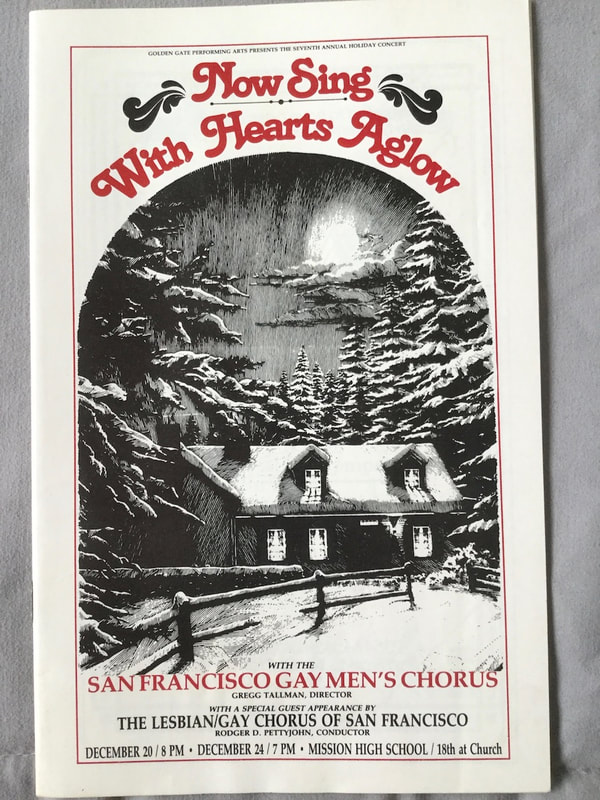
 RSS Feed
RSS Feed